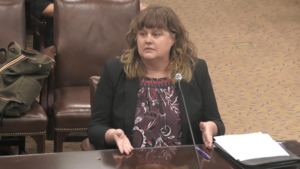
On Tuesday, October 8, Child Advocates Social Work Supervisor Laurie Ayler testified in front of the PA House Children & Youth Committee informational hearing in support of HB2617, a bill recently introduced by Representative Rick Krajewski (District 188) and Representative Sheryl Delozier (District 88) that will protect access to benefits for youth in foster care in Pennsylvania. Laurie was joined by national policy expert Amy Harfeld, Esq. of the Children’s Advocacy Institute, Aquilah David, Stoneleigh Youth Fellow at the Juvenile Law Center and Vaughn Jackson, a Pennsylvania resource parent with lived experience navigating foster benefits who had previously been interviewed by the Philadelphia Inquirer about the benefits his children were denied access. See below for the full transcript of her testimony and additional resources about the importance of protecting access to conserved benefits for youth in foster care.
Testimony of Laurie A. Ayler, LSW, Social Work Supervisor
The Support Center for Child Advocates is Philadelphia’s pro bono legal program dedicated to representing children involved in the city’s child welfare system. Each year, we assemble dedicated lawyer-social worker teams to advocate for approximately 900 children. Our legal and social services are delivered through Direct Representation Services and a Child Advocacy Training program. I have had the privilege of serving Child Advocates for over 16 years.
Today, we must address the critical need for county agencies to support youth in their care by connecting youth with all available benefits, and using or conserving benefits to meet the unique needs of each foster youth. Many children are eligible for Social Security benefits, whether due to a qualifying disability or through entitlements such as veterans’ or survivors’ benefits following the death of a parent. Unfortunately, in our state, when a child receiving these benefits enters foster care, their benefits are often discontinued. In many cases, the county agency appoints itself as the Representative Payee, the person responsible for managing benefits in the child’s best interest, and starts collecting these funds. While this practice is legal in Pennsylvania and elsewhere, it raises ethical concerns in that the child is now paying for their own foster care, something that does not occur for foster youth who are not eligible for benefits.
I commend Representatives Krajewski and Delozier for their efforts in shedding light on this issue with the proposed legislation. Thank you also to the members of the committee for your commitment to learning about and solving the problem at hand.
In the more than two decades I have worked as a social worker in Philadelphia, I have informed many families that they and their child would no longer have access to their benefits once they entered foster care. I have seen this impact their ability to maintain affordable housing as well as delaying and, at times, disrupting reunifications. In December 2021, the Philadelphia Inquirer published a story about a Philadelphia family who successfully recovered benefits taken by Philadelphia DHS. That case was a turning point for me—it confirmed that the system itself was deeply flawed. This same article led to the formation of a Philadelphia-based stakeholder group of which I became a member. That group has since grown to include advocates from around the state and country.
In September 2022, Philadelphia City Council passed an ordinance permitting the city’s Department of Human Services (DHS) to help youth connect with vital benefits, use or conserve benefits for youths’ current and future needs, and share information about benefits with youth and their representatives. Unfortunately, this ordinance has not been implemented. Philadelphia DHS cites a March 27, 2024 Special Transmittal from PA DHS stating that “under Pennsylvania law, 62 P.S. §704.2, and regulation, Title 55 Pa. Code §3170.31(b), state/local funds are not required to be used for a child/youth’s foster care maintenance payment(s) when the child/youth is eligible for or receiving benefits from other private, public, local, State or Federal programs.” Through advocacy with the stakeholder group and conversations with Philadelphia DHS, we realized that State legislation may be the only way to secure these supports for youth.
Social Security benefits exist to support the most vulnerable among us, providing financial assistance to improve their quality of life. Foster children, who are among the most vulnerable, should not lose this critical support. When their benefits are redirected to a general fund, advocates like myself find it difficult to obtain information and accounting of our clients’ benefits. The Social Security Administration will only speak to the Representative Payee and so we find ourselves in court arguing for our clients’ basic needs like new clothing, transportation to school, or medical appointments. If county agencies conserved these benefits for the intended children, those specific needs could be better met by drawing from a child’s own assets rather than burdening the court and agency staff with requests.
Many children in foster care eventually reunite with their families. Conserving their benefits during foster care could provide much-needed financial support for that child’s direct care upon reunification with their family. For foster youth who age out of the system without family support, access to conserved benefits could be life-changing, helping them afford essentials like groceries, childcare, rent, and utilities. I think of former clients now in their late 20s who are struggling to survive on limited SSI benefits—had they been given access to conserved funds, they would surely have had a more secure start to adulthood.
We must do better for our foster youth. As a social worker, I am committed to seeing positive change, ensuring that families who encounter our systems emerge with stronger support. If this bill advances, it will be a significant step toward that goal.
Additional resources